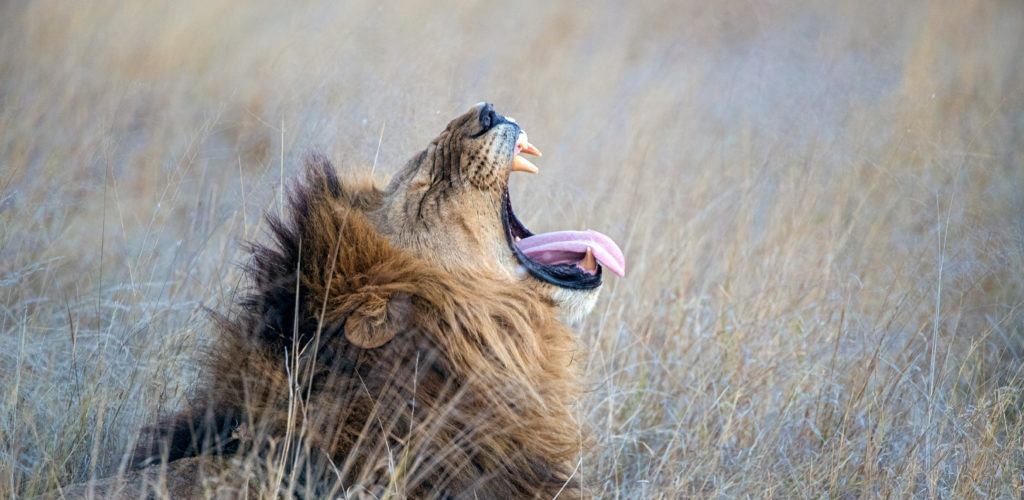
LEONARDO DICAPRIO FOUNDATION COMMITS $1 MILLION TO LION RECOVERY FUND TO PROTECT LIONS AND THEIR WILD AFRICAN LANDSCAPE.
The Wildlife Conservation Network announced today a $1 million commitment from the Leonardo DiCaprio Foundation (LDF) to the Lion Recovery Fund (LRF), which directs strategic grants to the most effective projects by vetted partners that can recover lions and their landscapes.
LDF Founder and Chairman Leonardo DiCaprio announced the commitment as part of a broad $20 million grant portfolio from his foundation to more than 100 organizations during a climate conference with former Secretary of State John Kerry.
“Lions are a keystone species and play a critical role in African ecosystems. Recovering them means the protection and restoration of Africa’s extraordinary biodiversity that drives a $34 billion tourism economy,” said Justin Winters, Executive Director of the Leonardo DiCaprio Foundation. “Investment in lion protection and recovery preserves this iconic symbol of Africa’s ecology and its economies.”
Over the last century, lion populations have seen a precipitous decline from 200,000 to just over 20,000. Much of this decline has resulted from the continent’s growing human population leading to conflict with lions, and the under-resourcing of Africa’s fabled parks and reserves.
“We are honored to drive philanthropic investments to the best efforts of the most effective conservationists working on the ground to help lions and their landscapes thrive,” said Jeffrey “Jefe” Parrish, Vice President for Conservation at the Wildlife Conservation Network. “If existing parks and reserves were properly resourced and managed, and if local communities were supported, Africa’s lion population could increase to more than three to four times its current size. The Lion Recovery Fund exists to fuel the best efforts by a coalition of conservationists to make this happen.”
To bring lions back, the Lion Recovery Fund is pleased to announce today new support to the following lion recovery projects in Malawi, Mozambique, Tanzania, and Zambia:
• In Malawi, support from the LRF will help African Parks Network reintroduce lions to Liwonde National Park now that improved management has recovered lion prey populations. Bringing lions back here will strengthen the ecosystem as well as Malawi’s growing tourism economy.
• A new grant from the LRF to the Greater Limpopo Carnivore Program will establish a lion protection unit in Mozambique’s Limpopo National Park, where new ranger units will tackle illegal bushmeat harvest, as well as the targeted poaching of lions – a just emerging yet massively destructive threat.
• Amy Dickman and team of the Ruaha Carnivore Project, will use LRF support to expand an innovative community engagement project near Ruaha National Park in Tanzania, training local communities to use camera traps to document the presence and abundance of lions and other wildlife. Communities are rewarded based on the frequency of sightings of lions and their prey, incentivizing communities to coexist peacefully with predators.
• Frankfurt Zoological Society will use this LRF support to improve protection of parklands in northern Zambia, which have fallen into neglect and suffered from human encroachment and bushmeat poaching.
• And recognizing that such commercialized bushmeat poaching – the illegal harvesting of prey species – kills both prey and predator indiscriminately and is decimating wildlife across Africa, the LRF will support Wildlife Crime Prevention in Zambia to educate the public about negative impacts of consuming illegal bushmeat.
To learn more about the Lion Recovery Fund and its grantees, visit www.lionrecoveryfund.org, like Lion Recovery Fund on Facebook and follow @LionRecovery on Twitter and Instagram.
About the Lion Recovery Fund
The Lion Recovery Fund (LRF) was created by the Wildlife Conservation Network (WCN) and the Leonardo DiCaprio Foundation to catalyze recovery of lions in critical landscapes across Africa, while creating a philanthropic and conservation movement to restore these African icons and their vast landscapes. The LRF invests in the best ideas from any institution, and sends 100% of donations to actions that can restore lions and their landscapes. As a result of efficiency and impact, The Wildlife Conservation Network is proud to have a number one rating for wildlife conservation organizations on Charity Navigator—with four stars and a perfect 100 score—and platinum status with Guidestar. Please visit: www.lionrecoveryfund.org

